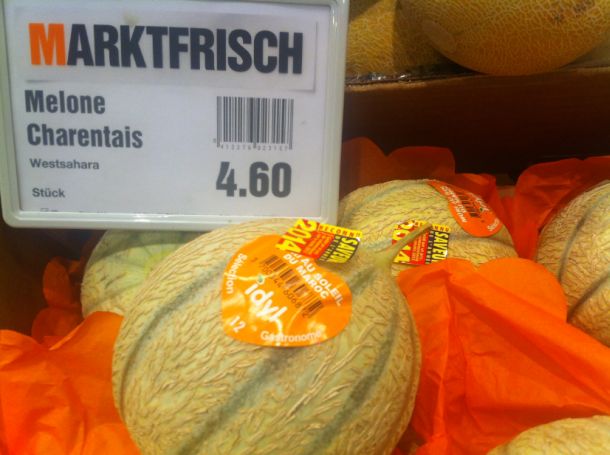
An example of doing the wrong thing the right way: Swiss supermarket chain Migros still imports from occupied Western Sahara, but is at least honest about it to its customers.
One of Switzerland’s largest supermarket chains, Migros, announced in 2013 that they would implement Western Sahara labels from 2014 onwards. A decision that has now been put into action.
The photo below was recently taken at a Migros supermarket. Notice how the melon still has a sticker from the Moroccan producer, saying "Mûri au soleil du Maroc" or "ripened in the sun of Morocco". Migros has seen through the smokescreen that Morocco wishes to uphold, and has put "Westsahara" or "Western Sahara" on its own label.
Migros imports melons from the French-Moroccan conglomerate Idyl. That company owns plantations in Morocco proper, but also in Dakhla – a town in the south of Western Sahara; a territory that Morocco invaded in 1975 and has partially occupied ever since. The United Nations classify Western Sahara as Africa's last colony.
Over the last decade, agro-business has been booming in the Dakhla area. The plantations and greenhouses are however owned by powerful Moroccans, French business interests or even the King of Morocco, not by Saharawis – the people of Western Sahara. They hardly even get job opportunities at these farms, as the owners prefer to hire seasonal workers from Morocco.
In 2012, WSRW published a report that documented how tomatoes, melons and other fruits grown in Dakhla ended up on the shelves of European supermarkets labelled as from Morocco.
When Migros found out that the melons they bought from Idyl did not come from Morocco, but from Western Sahara, they did not decide to end the imports, but rather to provide their customers with full information about the origin of the product through correct labelling.
"Migros is still not showing much respect for the rights of the Saharawis; they still choose to pay Moroccan-French business interests for produce grown on occupied land. But at least the grocery chain has the basic decency of informing their customers about the origins of the fruit, allowing them to make informed decisions", says Sara Eyckmans from Western Sahara Resource Watch.
According to the Swiss State Secretariat for Economic Affairs, Switzerland imported 30 million Swiss Francs of fruits and vegetables from Morocco in 2012. The lion's share of these imports were tomatoes.
Download the photo for a higher resolution.

Dirty green energy on occupied land
How can it be wrong to develop renewable energy, in a world that is in desperate need for a green transition? In Western Sahara, the problems are numerous.
EU Court adviser confirms separate and distinct status of Western Sahara
The Advocate General of the EU’s top Court backs the legal status of the people of Western Sahara. Final Judgment expected in a few months.
EU Court adviser: fruit from Western Sahara should not be labelled as from Morocco
Labelling those products as originating in the Kingdom of Morocco instead of originating in Western Sahara breaches EU law, the Advocate General of the EU Court of Justice concludes.
COWI abandons future projects in Western Sahara
After undertaking work for the Moroccan state phosphate company in Western Sahara, the Danish consultancy giant COWI states that it “will not engage in further projects" in the occupied territory.



